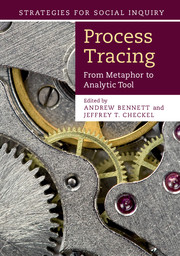Book contents
- Frontmatter
- Contents
- List of figures
- List of tables
- List of contributors
- Preface
- Part I Introduction
- Part II Process tracing in action
- 2 Process tracing the effects of ideas
- 3 Mechanisms, process, and the study of international institutions
- 4 Efficient process tracing
- 5 What makes process tracing good?
- 6 Explaining the Cold War’s end
- 7 Process tracing, causal inference, and civil war
- Part III Extensions, controversies, and conclusions
- Appendix Disciplining our conjectures
- References
- Index
4 - Efficient process tracing
Analyzing the causal mechanisms of European integration
Published online by Cambridge University Press: 05 November 2014
- Frontmatter
- Contents
- List of figures
- List of tables
- List of contributors
- Preface
- Part I Introduction
- Part II Process tracing in action
- 2 Process tracing the effects of ideas
- 3 Mechanisms, process, and the study of international institutions
- 4 Efficient process tracing
- 5 What makes process tracing good?
- 6 Explaining the Cold War’s end
- 7 Process tracing, causal inference, and civil war
- Part III Extensions, controversies, and conclusions
- Appendix Disciplining our conjectures
- References
- Index
Summary
Introduction
Why a separate chapter on the European Union (EU) in a volume on process tracing? Is there anything distinct about the analysis of European politics that would merit a special treatment? In general, the answer is no. The methodological challenges of studying the EU are pretty much the same as in other areas of research (although, see Lyall, this volume, Chapter 7, on process tracing and civil war), and EU scholars have used the same toolboxes as those working on other polities. There is one major field of inquiry, however, in which process tracing has taken pride of place for both empirical and theoretical reasons: the study of European integration.
The study of European integration is about the development of the EU: the transfer of tasks from the state to the European level of governance, the growth of EU competences, and the expansion of membership. By contrast, the study of EU politics and policies deals with elections, legislation, compliance, and other topics that are well established in the analysis of other political systems. Standard methods of quantitative or comparative analysis are commonly used in these areas.
- Type
- Chapter
- Information
- Process TracingFrom Metaphor to Analytic Tool, pp. 98 - 125Publisher: Cambridge University PressPrint publication year: 2014
- 26
- Cited by

